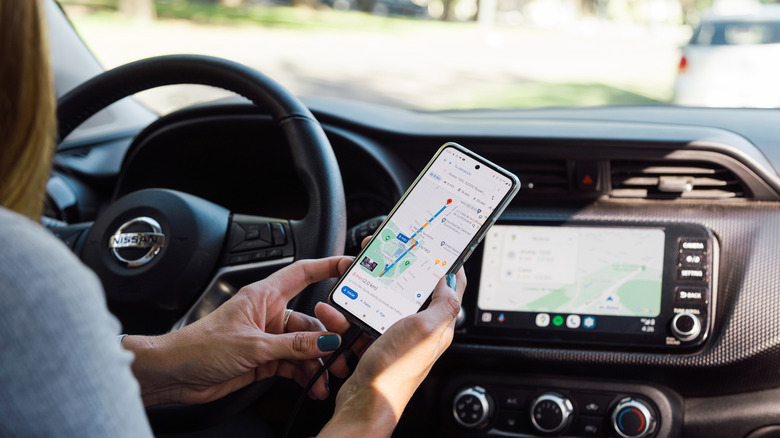Why Tourists Should Avoid Charging Phones In Rental Cars
We may receive a commission on purchases made from links.
When you rent a car on vacation, you're likely using your phone for navigation. You may even bring accessories like a car mount, so no one ever has to look at a paper map. You might also use your phone to crank up some driving tunes or listen to an audiobook to relax as you explore a brand new place. Of course, that drains the phone's battery, and when it runs low, you may be tempted to plug it right into the car's infotainment system to charge. But that is a big mistake. As convenient as it seems, charging your phone in a rental car can expose you to information theft. The same risk applies if you sync your phone with the system to play music through the car's stereo, or for any other purpose. If you want to protect your data, avoid doing so.
In 2024, auto repair specialist and director of educational programs at Bolt on Technology, John Burkhauser, told Reader's Digest, "The USB cable and outlet are designed not only to charge the connected device, but they are also designed for two-way data transfer." He explained that information from your phone can be stored in the car. That means other rental customers, or anyone with access to the car could see details such as financial information, passwords, and even text messages.
The best way to keep your information safe when using a phone in your rental car
If someone does get your information, some rental car companies put the responsibility on the consumer rather than the company. You can, of course, delete your information from the car's infotainment center settings, but first, you'd have to know how. And even if you do, the end of a vacation is like is usually hectic — you're rushing to get everyone ready, finding an affordable gas station to top off the tank, and leaving enough time to catch a flight. Deleting your data is likely the last thing on your mind. The safest option is not to connect in the first place. That also goes for charging at a USB port at the airport, according to an FBI warning, or using the common hotel TV hack where you charge your phone in the TV's USB port.
Now, there are safer ways to keep your phone powered. First, it's always a good idea to bring a charging block when you travel. You can plug that into a USB port since it holds no personal data, then charge your phone directly from the block. Another option is to purchase a USB data blocker, such as the JSAUX USB Data Blocker on Amazon. If you do, be sure the charger matches your device and the connection type — USB-C to USB-A, for instance — or choose a universal USB blocker with several connection types. Keeping one handy can help keep your phone data safe, wherever you are.

